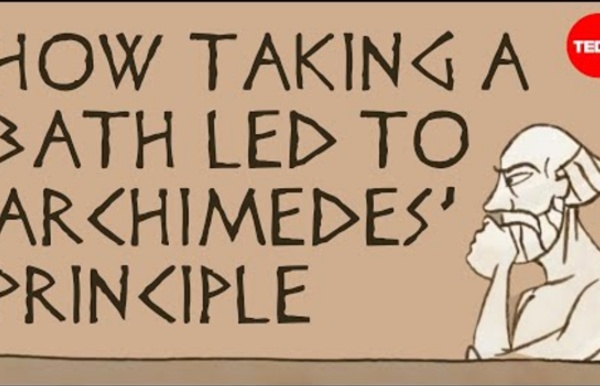



BBC Bitesize - KS2 History - Discovering the work of Archimedes BBC Bitesize - How did the Olympic Games begin? Archimedes Archimedes, as an artist thinks he was. Archimedes (287 BC–212 BC)[1] was a Greek scientist. He was an inventor, an astronomer, and a mathematician. He was born in the town of Syracuse in Sicily. His father was Phidias, an astronomer, and he may have been in the family of a king of Syracuse. Spherical geometry[change | change source] On the Sphere and Cylinder is a work that was published by Archimedes in two volumes in about 225 BC.[2] On the sphere, he showed that the surface area is four times the area of its great circle. The surface area of a cylinder is equal to: The volume of the cylinder is: A sculpted sphere and cylinder were placed on the tomb of Archimedes at his request. Archimedes the scientist[change | change source] Archimedes is also well known for being the first person to understand statics, which is a part of applied mathematics. Archimedes may have used his principle of buoyancy to determine whether the golden crown was less dense than solid gold.
BBC Bitesize - Who were the ancient Greek gods and heroes? Archimedes Facts for KidsEasy Science For Kids Is there something you love so much that you could spend hours doing it? Maybe you love video games, reading or watching movies. Archimedes was an ancient mathematician who lived 200 years before Christ’s birth. He loved math so much that sometimes he forgot to eat while he was figuring problems. All About Archimedes, an ancient mathematician who lived 200 years before Christ’s birth. Archimedes is considered to be one of the most brilliant mathematicians in history. Legend has it that the king worried that the royal crown maker might be replacing some of the gold in his crowns with a less valuable material. Archimedes thought of the solution about finding gold purity while in bath tub. King Hiero called upon Archimedes to design war machines to defend the country against the Romans who were intent on invading. Archimedes Vocabulary Brilliant: exceptionally brightEquation: problemAstronomer: Scientist who studies the stars and planetsValuable: precious, worthwhileSlain: killed
Fairtrade for children | Fairtrade homework help | Fair trade for KS1 and KS2 The very beginnings of the fair trade movement started as long ago as the 1960s. It wasn’t until the 1990s that a Fairtrade Mark was created and a series of required ‘standards’ were set out. Fairtrade aimed to improve the conditions, community facilities and pay for certain farmers and workers. The Fairtrade ‘standards’ are a detailed list of things that need to be achieved before products can be classified as Fairtrade goods. The first product to be classified as Fairtrade was Maya Gold chocolate, made by Green and Blacks, in 1994. Some people have argued that Fairtrade has a negative effect on what is called the ‘free market’, where products are produced when they are needed and farms can grow in size and grow different crops as well as use new mechanical equipment, if the demand for their product increases. Community – the people who live in and share a specific area, often working together and socialising together. Fair trade – a movement encouraging fairer trading conditions.
Who was Archimedes? - Eureka! The Archimedes Principle Greek theater at Syracuse Archimedes was born about 287 BC, so he was a little younger than Euclid. His father was an astronomer. Archimedes was related to the tyrant who ruled Syracuse, on the island of Sicily, and he lived his whole life in Sicily, except when he went to study at the University of Alexandria in Egypt, where he probably met and worked with the other great scientists of his time: Euclid, Aristarchus, and Eratosthenes. Archimedes worked mainly in a losing battle to defend his city-state from the Romans, who were attacking Syracuse in the course of the First Punic War. Archimedes invented, or people said he had invented, a bunch of different kinds of machines. But Archimedes was also interested in why things worked, and whether they would work the same way every time. Archimedes also worked out a way to calculate the volume of an irregular object. Learn by doing: put things in water and see if they float, and discuss why More about Roman science Other mathematicians:
BBC Bitesize - KS2 History - What did the Greeks do for us?
La vidéo est en anglais mais vous pouvez activer les sous-titres. by ameneu Feb 23